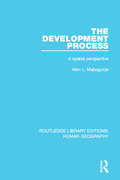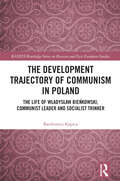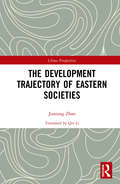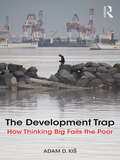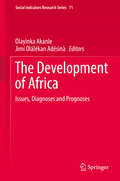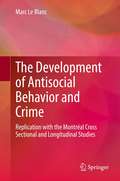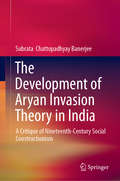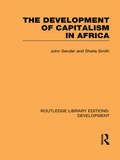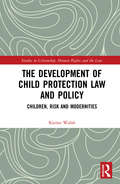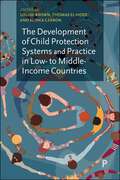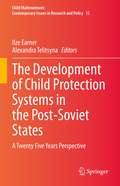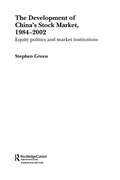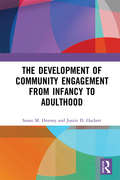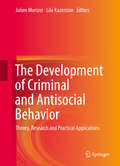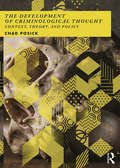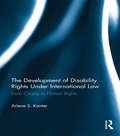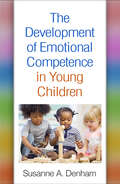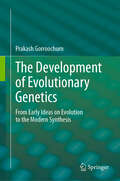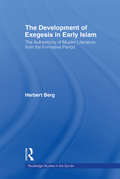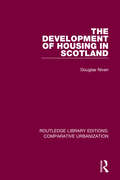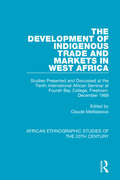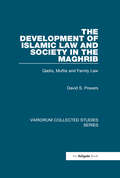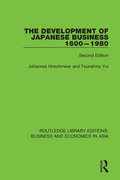- Table View
- List View
The Development Process: A Spatial Perspective (Routledge Library Editions: Human Geography)
by Akin MabogunjeWritten from the perspective of developing countries, this book discusses the development process from a spatial perspective, focussing particularly on the evoltuion of the intra-national space-economy. With emphasis on African nations, this book offers a distinctive interpretation of the current situation and policy prescriptions differing significantly from previous literature in the area.
The Development Trajectory of Communism in Poland: The Life of Władysław Bieńkowski, Communist Leader and Socialist Thinker (BASEES/Routledge Series on Russian and East European Studies)
by Bartłomiej KapicaCharting the life and writings of Władysław Bieńkowski, a leading politician and writer in communist Poland and sometime right-hand man and ideologue of the Polish leader Władysław Gomułka, this book outlines the shifts in the nature of communism in Poland throughout the period of communist rule.It considers the shaping of Bieńkowski’s ideas in eastern Poland, later occupied by the Soviet Union, during the economic depression, the development of his great hopes for socialist socio-economic transformation as the right way forward, and his attempts as Gomułka's aide to enact “people’s democracy” and “socialist humanism” in the period 1945 to 1948, attempts which failed, Stalinist repression coming to the fore instead. This book further discusses Bieńkowski’s role as a minister in the period following Stalin’s death, when Bieńkowski was a leading “revisionist”, warning of the dangers of the “petrification of the system”, and explains how with a sense of shattered hopes he resigned from power and became a dissident, publicly critical of the regime. This book concludes by examining Bieńkowski’s writings in late communist times when, now just an observer, he continued to reflect on and write about the future of socialism. Overall, the book demonstrates to what extent communism in Eastern Europe was flexible and adaptable and not rigidly monolithic as it is often portrayed.The book will be of interest to academics and scholars interested in the history of communism and Europe.
The Development Trajectory of Eastern Societies (China Perspectives)
by Zhao JiaxiangIn the four volumes of The Development Trajectory of Eastern Societies and the Theories and Practices of Socialism, the author re-examines Marx and Engels’ theories on the development trajectory of Eastern societies by integrating theoretical analysis of Marxist theories and a historical investigation of socialist revolution and socialist construction around the world. Pointing out the guiding significance of five aspects of the basic principles of Marxism for studying how Eastern societies develop, this volume interrogates various assumptions that have prevailed in academia, addresses unexplained topics, and offers insight into the understanding of these basic principles. The result is a penetrating and specific understanding of Marxist basic principles and the development trajectory of Eastern societies. Critical engagement with predominant understandings and a refreshing reformulation of Marxist theoretical bases make the book a key new reference for readers who are studying or are interested in Marxism, Marxist philosophy, and the history of philosophy.
The Development Trap: How Thinking Big Fails the Poor
by Adam D. KišA wave of optimism is sweeping through the international aid and development industry, championed by leaders such as Jeffrey Sachs and Jim Yong Kim, who believe that poverty eradication could be within our grasp. Yet in stark opposition come those who believe that all international development intervention is hegemonic, paternalistic, and neocolonialist and must be done away with. In this book, Adam D. Kiš argues for a middle ground. Poverty is an entrenched, intractable problem that will never be entirely eradicated. However, if we reorientate our objectives in line with realistic goals that improve the way that poverty is confronted on a smaller scale, we can still continue the fight for meaningful change. Using rigorous scholarship illustrated with vivid storytelling and personal anecdotes from fighting against poverty in the field, The Development Trap argues that we need to make progress against poverty on the micro, rather than the macro scale. Instead of shooting for a single overarching end of poverty, our goals must be modest and reachable. Poverty still won’t go away, on a macro scale, but it can go away for specific individuals - in fact, it already happens all the time. The Development Trap is a compelling account of the challenges of eradicating poverty, and the possibilities for meaningful change at a smaller scale. It will be perfect for international development professionals, students and scholars, and for those with a general interest in the future of aid and development.
The Development of Africa
by Olayinka Akanle Jìmí Olálékan AdésìnàThis volume analyses many of the real development challenges confronting the African continent, presenting fresh and current objective examinations, narratives, interpretations and pathways to the continent’s development. It interrogates and answers established, critical, current and pragmatic problems confronting Africa today, and provides workable pathways out of the development problems, so that scholarship, policy and practice will be positively impacted. This volume adds great depth and extended breadth to the knowledge base on development of Africa. It provides excellent resources for academics, scholars, student, policy makers and all those interested in issues affecting Africa’s development.
The Development of Antisocial Behavior and Crime: Replication with the Montreal Cross Sectional and Longitudinal Studies
by Marc Le BlancThis innovative and timely work explores how the developmental criminology paradigm can be applied to understandings beyond criminal careers, to the development of more general antisocial behavior. Importantly, the rich data set from 50-years of cross sectional and longitudinal studies provides replication amongst samples, genders, generations and phases in the life span, from cohorts born in the 1960s, 1970s, 1980s, and 1990s. This work also provides a rich history about the development of the “Developmental Criminology” paradigm, drawing from developmental psychology, and life-course methodologies in Sociology. With a 50-year, multigenerational longitudinal dataset (the Montreal Two Sample Four Generational Cross sectionnal and Longitudinal Studies –MTSFGCLS) the author explores the mechanisms of official and self-reported antisocial behavior. It provides insights into not only criminal behavior, but other types of potentially problematic behavior, including drug and alcohol use, risky sexual behavior, conflict with authority and other forms of antisocial behavior; as well as their decline across the life-course. By examining the developmental mechanisms and trajectories of these behaviors, the author proposes a multidisciplinary theory to explain these phenomenons. This work will be of interested to researchers in Criminology, Sociology and Psychology, particularly within the growing area of Developmental and Life-Course Criminology, as well as related fields such as social work, public health and public policy.
The Development of Aryan Invasion Theory in India: A Critique of Nineteenth-Century Social Constructionism
by Subrata Chattopadhyay BanerjeeThis book delves deep into the Social Construction of Theory, comparative epistemology and intellectual history to stress the interrelationship between diverse cultures during the colonial period and bring forth convincing evidence of how the 19th century was shaped. It approaches an interesting relation between the linguistic studies of 19th century’s scientific world and subsequent widespread acceptance of the empirically weak theory of the Aryan invasion. To show entangled history in a globalized world, the book draws on the Aryan Invasion Theory to highlight how different socio-religious parties commonly shape a new theory. It also explores how research is affected by the so-called social construction of theory and comparative epistemology, and deals with scholarly advancement and its relation with contemporary socio-political demands. The most significant conclusion of the book is that academic studies are prone to comparative epistemology, even under the strict scrutiny of the so-called scientific methods.
The Development of Bioethics in the United States
by Jeremy R. Garrett D. Christopher Ralston Fabrice JotterandIn only four decades, bioethics has transformed from a fledgling field into a complex, rapidly expanding, multidisciplinary field of inquiry and practice. Its influence can be found not only in our intellectual and biomedical institutions, but also in almost every facet of our social, cultural, and political life. This volume maps the remarkable development of bioethics in American culture, uncovering the important historical factors that brought it into existence, analyzing its cultural, philosophical, and professional dimensions, and surveying its potential future trajectories. Bringing together a collection of original essays by seminal figures in the fields of medical ethics and bioethics, it addresses such questions as the following: - Are there precise moments, events, socio-political conditions, legal cases, and/or works of scholarship to which we can trace the emergence of bioethics as a field of inquiry in the United States? - What is the relationship between the historico-causal factors that gave birth to bioethics and the factors that sustain and encourage its continued development today? - Is it possible and/or useful to view the history of bioethics in discrete periods with well-defined boundaries? - If so, are there discernible forces that reveal why transitions occurred when they did? What are the key concepts that ultimately frame the field and how have they evolved and developed over time? - Is the field of bioethics in a period of transformation into biopolitics? Contributors include George Annas, Howard Brody, Eric J. Cassell, H. Tristram Engelhardt Jr., Edmund L. Erde, John Collins Harvey, Albert R. Jonsen, Loretta M. Kopelman, Laurence B. McCullough, Edmund D. Pellegrino, Warren T. Reich, Carson Strong, Robert M. Veatch, and Richard M. Zaner.
The Development of Capitalism in Africa (Routledge Library Editions: Development)
by Sheila Smith John SenderFirst published in 1986, this work challenges underdevelopment analyses of Africa’s past experiences and future prospects, and builds upon a very wide range of recent historical research to argue that the impact of Capitalism has resulted in economic progress and significant improvements in living standards. In marked contrast to the dependency approach, they propose that the important political and economic differences between the experiences of developing countries should be stressed and analysed. The argument is supported by a detailed look at the emergence since 1900 of capitalist social relations of production in nine different countries.
The Development of Capitalism in Russia (Routledge Contemporary Russia and Eastern Europe Series)
by Simon ClarkeThis book provides a broad and comprehensive survey of the development of capitalism in Russia from the collapse of the Soviet economic system to the present, and includes the results of substantial new research on the current state of a wide range of Russian enterprises. Simon Clarke – a well-known authority in this area: surveys the old Soviet system charts the progress through the early post-Soviet period, when neo-liberal theorists’ ‘shock therapy’ did not lead to the immediate development of a capitalist market economy, and traditional enterprises became hugely loss-making considers the crisis of 1998, and its effects, which included the curtailment of speculation, and growing investment in the old industrial sector, which in turn put the new small and medium sized enterprises under increasing pressure discusses the wider theoretical implications of the Russian experience for other transitional economies.
The Development of Child Protection Law and Policy: Children, Risk and Modernities (Studies in Citizenship, Human Rights and the Law)
by Kieran WalshThis book examines how child protection law has been shaped by the transition to late modernity and how it copes with the ever-changing concept of risk. The book traces the evolution of the contemporary child protection system through historical changes, assessing the factors that have influenced the development of legal responses to abuse over a 130-year period. It does so by focussing on the Republic of Ireland where child protection has become emblematic of wider social change. The work draws on a wide range of primary and secondary sources including legislation, case law and official and media reports of child protection inquiries. It also utilises insights developed through an extensive examination of parliamentary debates on child protection matters. These materials are assessed through the lens of critical discourse analysis to explore the relationship between law, social policy and social theory as they effect child protection. While the book utilises primarily Irish sources, this multidisciplinary approach ensures the argument has international applicability. The book will be a valuable resource for all those with an interest in the development of child protection law.
The Development of Child Protection Systems and Practice in Low- to Middle-Income Countries
by Louise Brown, Thomas El-Hoss and Alinka GearonChild protection systems across the globe are developing at pace, each reflecting their unique economic, social, and cultural contexts. This book provides an overview of 11 child protection systems from low- and middle-income countries and discusses the formal and informal responses countries are making to the shared problem of child abuse and maltreatment. Within each chapter, vignettes give readers a window into how each country’s child protection system operates in practice. This is essential reading for academics, social work professionals and anybody working within child and family welfare.
The Development of Child Protection Systems in the Post-Soviet States: A Twenty Five Years Perspective (Child Maltreatment #12)
by Ilze Earner Alexandra TelitsynaThis volume provides an understanding of how systems of child protection evolve in disparate cultural, social and economic contexts. Using the former Soviet Union as a starting point, it examines how 13 countries have developed, defined and evolved their system of protecting children and providing services to families over the last 25 years since independence. The volume runs an uniform approach in each country and then traces the development of unique systems, contributing to the international understanding of child protection and welfare. This volume is a fascinating study for social scientists, social workers, policy makers with particular interest to those focusing on children, youth, and family issues alike as each chapter offers a clear and compelling view of the central changes, competing claims and guiding assumptions that have formed each countries individual approach to child protection and family services.
The Development of China's Stockmarket, 1984-2002: Equity Politics and Market Institutions (Routledge Studies on China in Transition)
by Stephen GreenAs China's government manages a transition away from the socialist plan, how does it build the regulatory institutions it needs to manage the new market economy? Without the correct institutions, laws and agencies that implement the laws in place, the remarkable growth witnessed in China over the last two decades will falter. Financial sector reform lies at the heart of China's economic transition and China's stock market has become critical to the reform of state-owned industry, the supply of fiscal revenues and in building a modern pension system. The Development of China's Stockmarket takes a close look at the policy-making and regulatory institutions the government has created to manage equity development and shows how, in contrast to neo-institutional and economic theories of regulatory development, public actors have controlled institutional development.Based on extensive field research in Shanghai, Shenzhen and Beijing and over forty interviews with regulators and market players, The Development of China's Stockmarket provides the first detailed academic analysis of the country's stockmarket. With a comprehensive review of Chinese language literature available on the subject, this book is essential reading for all scholars with an interest in Asian Business and China's transition from socialism.
The Development of Community Engagement from Infancy to Adulthood
by Susan M. Henney Justin D. HackettThe Development of Community Engagement from Infancy to Adulthood uses a developmental perspective to trace how individuals develop the cognitive, behavioral, emotional, and moral capacity to be actively engaged in their communities. It also provides an analysis of the role of volunteerism and civic engagement in an era of social division, shrinking budgets, and shrinking services. In order to support childhood and adolescent volunteerism, we must understand how children become adults who volunteer a lot, sometimes, or not at all. This book describes the development of volunteerism from theoretical, empirical, and practical viewpoints, starting from the earliest development of empathy, through the social institutions that help shape us, to adolescence and young adulthood. It concludes with an analysis of modern ways to engage young citizens in social action. In doing so it addresses the key question – how can we encourage and support the development of the behaviors, belief systems, and ecologies that will lead to volunteerism and community involvement in our citizens? With fresh and thought-provoking arguments and insights, this book will be of interest to all academics and students working within the fields of social work, social services, volunteer management, applied social psychology, community psychology, service learning, and sociology, as well as non-profit personnel and activists.
The Development of Criminal and Antisocial Behavior
by Julien Morizot Lila KazemianThis edited book summarizes the current state of knowledge on the development of criminal and antisocial behavior over the life course. It focuses mainly on the developmental perspective, which has had a paradigmatic influence on current theoretical and empirical works in criminology. With a multidisciplinary perspective, the book reviews: (a) the fundamental concepts of developmental criminology; (b) the risk factors and developmental processes related to the most salient personal (e. g. , genetics, personality) and environmental (e. g. , family, peers, school) domains explaining the development of criminal and antisocial behavior; (c) the developmental issues related to a number a special themes (e. g. , women criminality, street gangs) and (d) the applied and policy implications of research in developmental criminology. In each chapter, prominent researchers from different disciplines such as criminology and psychology summarize the state of knowledge on a specific topic, identify the shortcomings of past research, offer recommendations for future research needs.
The Development of Criminological Thought: Context, Theory and Policy
by Chad PosickThis book focuses on the history and development of criminological thought from the pre-Enlightenment period to the present and offers a detailed and chronological overview of competing theoretical perspectives in criminology in their social and political context. This book covers: A discussion of how major theorists came to espouse their ideas and how the social context of the time influenced the development criminological thought; An exploration of the scientific method and the way in which theories are tested; Details of the origins of each theory as well as their recent developments in scholarship and research; Comparative and international research in theory; The empirical support for theory and the relationship between research and policy; Biosocial and developmental criminology, including the biosocial underpinnings of criminal behavior and the influence of neuroscience and brain psychology; Theoretical applications for explaining different crime types, such as genocide, white-collar crime, and environmental crime; A summary of the current state of criminological knowledge and a vision for the future of criminology. The book includes lists of further reading and chapter summaries, and is supported by timelines of key works and events. This book is essential reading for courses on criminological theory, criminal behaviour, criminal psychology and biosocial criminology.
The Development of Disability Rights Under International Law: From Charity to Human Rights
by Arlene S. KanterThe adoption of the Convention on the Rights of People with Disabilities (CPRD) by the United Nations in 2006 is the first comprehensive and binding treaty on the rights of people with disabilities. It establishes the right of people with disabilities to equality, dignity, autonomy, full participation, as well as the right to live in the community, and the right to supported decision-making and inclusive education. Prior to the CRPD, international law had provided only limited protections to people with disabilities. This book analyses the development of disability rights as an international human rights movement. Focusing on the United States and countries in Asia, Africa, the Middle East the book examines the status of people with disabilities under international law prior to the adoption of the CPRD, and follows the development of human rights protections through the convention’s drafting process. Arlene Kanter argues that by including both new applications and entirely new approaches to human rights treaty enforcement, the CRPD is significant not only to people with disabilities but also to the general development of international human rights, by offering new human rights protections for all people. Taking a comparative perspective, the book explores how the success of the CRPD in achieving protections depends on the extent to which individual countries enforce domestic laws and policies, and the changing public attitudes towards people with disabilities. This book will be of excellent use and interest to researchers and students of human rights law, discrimination, and disability studies.
The Development of Emotional Competence in Young Children
by Susanne A. DenhamThis engaging, authoritative text synthesizes a vast body of research on how young children develop the ability to understand, express, and manage their emotions, as well as the impact of these capacities on relationships, school readiness, and overall well-being. Illustrated with vivid vignettes, the book explains specific ways that parents, teachers, and education systems can foster or hinder emotional competence, and reviews relevant assessments and interventions. Compelling topics include emotion regulation as both product and process, cultural variations in emotion socialization, the expression of empathy and self-conscious emotions, risk factors for delays in emotional development, and connections between emotional competence and social–emotional learning (SEL). Almost entirely new, this book replaces Susanne A. Denham's influential earlier work, Emotional Development in Young Children.
The Development of Evolutionary Genetics: From Early Ideas on Evolution to the Modern Synthesis
by Prakash GorroochurnThe books describes the historical development of evolutionary genetics, starting from early ideas on evolution and ending with the modern synthesis. It provides an extensive coverage of the history of both evolution and heredity, and gives detailed descriptions of the works of Lamarck, Darwin, Mendel, Näageli, Weismann, de Vries, Galton, Pearson, Bateson, Johannsen, Morgan, Fisher, Wright and Haldane, amongst many others. The book does not deal only with a description of historical work: it also analyses and critiques existing theories and evolutionary beliefs throughout history, and discusses several controversies between biologists.
The Development of Exegesis in Early Islam: The Authenticity of Muslim Literature from the Formative Period (Routledge Studies in the Qur'an)
by Herbert BergThe most important debate in Islamic origins is that of the reliability of the lists of transmitters (isnads) that are said to guarantee the authenticity of the materials to which they are attached. Many scholars have come to the conclusion that most traditions (hadiths), which claim to preserve the words and deeds of Muhammad and early Muslim scholars, are spurious. Other scholars defend hadiths and their isnads, arguing for an early continuous written transmission of these materials. The first purpose of this study is to summarize and critique the major positions on the issue of the authenticity of hadiths in general and exegetical hadiths in particular. The second purpose is to devise a means of evaluating isnads that does not rely on circular arguments and to use it to determine if the hadiths in the Tafsir of al-Tabari, attributed to Ibn 'Abbas, are genuine.
The Development of Housing in Scotland
by Douglas NivenOriginally published in 1979, this volume begins with an historical summary of housing development in Scotland. Scottish urban housing has always followed a unique and distinctive pattern from the rest of the UK, resembling more closely the flatted developments of Continental Europe. The book compares the policies and programmes of development in EU countries and Scandinavia. The problems caused by over-emphasis on public-sector housing in Scotland since the First World War are discussed. A break-down of the work carried out by housing societies and associations reveals little national or local support in Scotland, unlike in European or Scandinavian countries where such association have formed a vital element in their housing policies.
The Development of Indigenous Trade and Markets in West Africa: Studies Presented and Discussed at the Tenth International African Seminar at Fourah Bay College, Freetown, December 1969
by Claude MeillassouxOriginally published in 1971 and written in English and French, with summaries in both languages, the essays in this volume dsicuss the effects of internal economic and political conditions and of external relations on the development of trade and markets in West Africa from the period of the slave trade to the growth in the 20th century in production for overseas markets and rapidly expanding urban centres. Other essays discuss various aspects of local and regional trade and markets from the nineteenth century onwards.
The Development of Islamic Law and Society in the Maghrib: Qadis, Muftis and Family Law
by David S. PowersThe first eleven essays in this collection treat the application of Islamic law in qadi courts in the Maghrib in the period between 1100 and 1500 CE. Based on preserved legal documents and the expert opinions of Muslim jurists (Muftis), the essays examine family law cases involving legal minority, guardianship, divorce, inheritance, bequests, and endowments. Cumulatively, the cases bear witness to the effectiveness and efficiency of the Islamic judicial system in this period. Contrary to popular perceptions, the cases demonstrate that Muslim jurists placed a high value on reasoned thought and were sensitive to the manner in which law, society, and culture interacted with, and shaped, each other. The final essay shows how the treatment of family endowments by colonial regimes in Algeria and India at the end of the 19th and beginning of the 20th centuries shaped, or misshaped the modern western scholarly understanding of Islamic law.
The Development of Japanese Business, 1600-1980: Second Edition (Routledge Library Editions: Business and Economics in Asia #8)
by Johannes Hirschmeier Tsunehiko YuiThe study, first published in 1981, traces the history and development of Japanese business from the seventeenth century, and is the only text that systematically treats the rise of Japanese business in its full complexity and against the background of contemporary social and political conditions. Each section discusses the socio-economic conditions, the leadership and business elites, the internal and external structures and the impact of values. The emergence of new types of businessmen, their ideas and approaches, their relations to the government, their handling of labour problems are all analysed. One of the most intriguing aspects of this study is the unique importance of Japanese values, their tenacious persistence and uncanny flexibility and resilience. The strengths and weaknesses of these values are examined in detail.
